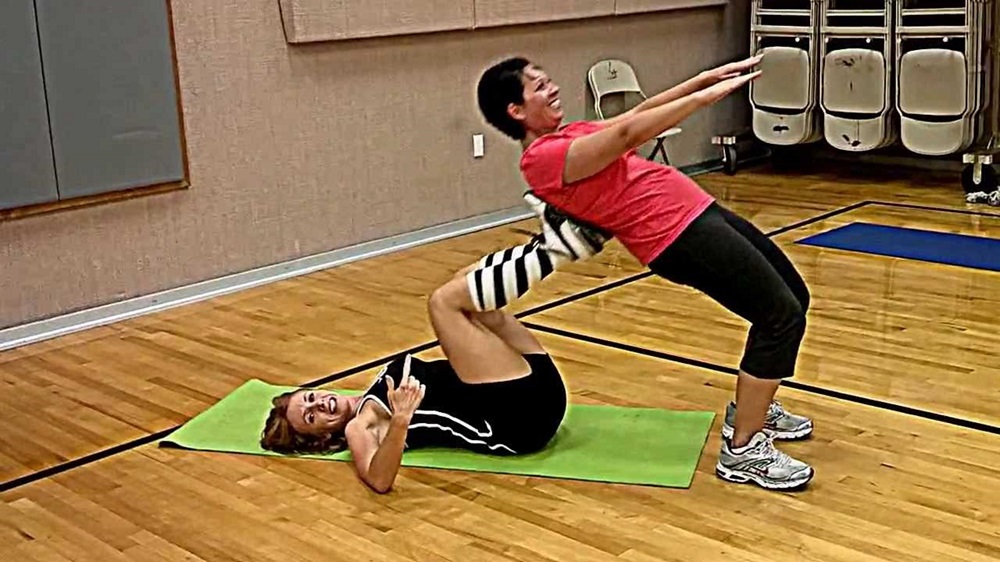Last Updated on: 18th December 2024, 12:36 pm
Partner workouts involve two individuals engaging in exercise routines together. This method diversifies the workout experience and introduces motivation, accountability, and enjoyment. Exercising with a partner can transform a routine task into an engaging and supportive journey towards health and wellness.
- Benefits extend beyond the physical: They foster a sense of camaraderie and mutual encouragement.
- Variety of exercises: From synchronized bodyweight exercises to shared equipment routines.
- Enjoyment: The shared experience can make the workout more enjoyable, turning it into a fun activity rather than a chore.
Choosing the Right Partner
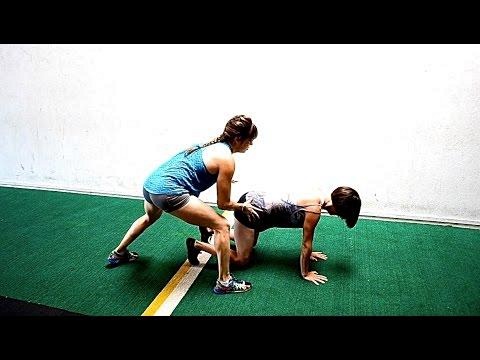
Finding the right workout partner is crucial for maintaining motivation and achieving your fitness goals. Compatibility in fitness levels and aspirations ensures that both participants can progress without feeling held back or overwhelmed. This harmony fosters a supportive environment where both individuals can thrive.
- Start within your social circle: Friends or colleagues who share similar fitness interests are great candidates.
- Online fitness communities and local gyms: These venues are ripe with potential partners who are already in the mindset to improve their health and fitness levels.
- Set mutual goals and expectations: Discuss your fitness objectives, availability, and preferred workout routines to ensure alignment.
The right partner can transform your workout from a solitary chore to an enjoyable, shared journey towards better health. With the right match, you’ll find yourself looking forward to each session, motivated by the shared commitment and the progress you make together.
Essential Equipment and Preparation
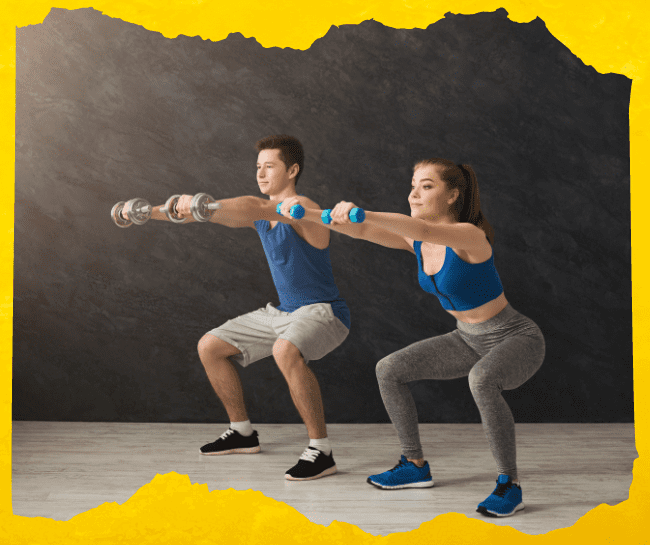
Basic Equipment for Partner Workouts
Embarking on a partner workout journey requires minimal yet specific equipment to maximize effectiveness and enjoyment. Resistance bands and medicine balls stand out as versatile essentials. These tools not only enhance a wide range of exercises but also encourage teamwork and synchronization, making your workout both challenging and fun. Their adaptability to different fitness levels ensures that both partners can engage fully, regardless of their individual strengths or weaknesses.
Proper Attire and Hydration
- Right attire: Comfortable, breathable clothing allows for a full range of motion.
- Staying hydrated: Keeping a water bottle handy maintains hydration levels, essential for peak performance and recovery.
Warm-Up Routines
Before diving into the main workout, a joint warm-up routine sets the tone for a successful session. Dynamic stretches and light cardio exercises, such as jogging in place or jumping jacks, prepare the body and mind for the workout ahead. This shared beginning not only warms up the muscles but also strengthens the bond between partners, aligning your energies and focus. A comprehensive warm-up reduces the risk of injury and enhances the overall workout experience, making it an indispensable part of your routine.
Core and Strength Building Exercises for Two

Core Strengthening Together
- Plank High-Fives: Both partners assume the plank position facing each other, alternating high-fives with opposite hands, maintaining a stable and engaged core throughout.
- Partner Leg Throws: One partner lies on their back, legs straight, while the other gently throws the legs down towards the floor, the lying partner resisting the force and using their core strength to bring the legs back up.
Building Strength Side by Side
- Squat Holds with Medicine Ball Pass: Partners face each other in a squat position, passing a medicine ball back and forth to add resistance and improve coordination.
- Back-to-Back Wall Sits: Partners sit back-to-back in a wall sit position, challenging each other to maintain the pose for as long as possible, thereby strengthening the lower body and core.
Tips for Success
- Maintaining proper form: Crucial in preventing injury and maximizing the benefits of partner workouts.
- Communication is key: Always alert your partner if you’re feeling fatigued or if the exercise doesn’t feel right.
- Controlled and deliberate movements: Focus on quality over quantity, starting with lighter weights or fewer repetitions and gradually increasing as you both become more comfortable.
Partner workouts not only enhance physical fitness but also strengthen the bonds between participants. By engaging in these core and strength-building exercises, partners can enjoy a fun, effective, and mutually beneficial workout experience. So grab a partner, and start building a stronger foundation together.
Cardiovascular Exercises for Pairs
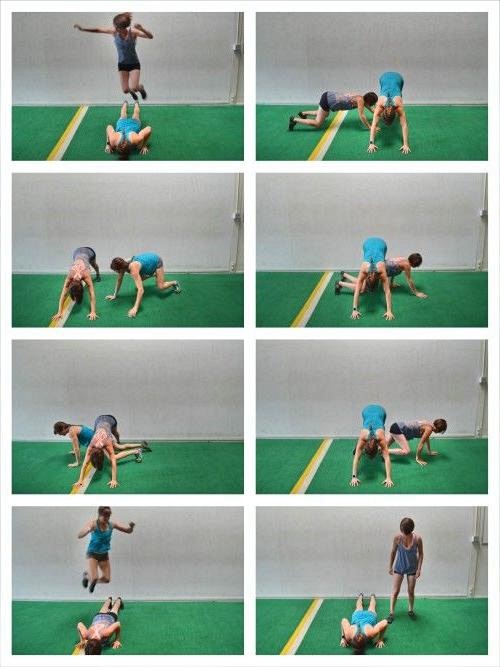
Introduction to Partner-Enhanced Cardio Exercises
Cardiovascular exercises are a cornerstone of any fitness regimen, vital for heart health and stamina. When performed with a partner, these exercises not only become more enjoyable but also more effective. Partner Sprints and Lateral Jumps over a Partner are prime examples of cardio workouts that can be elevated through collaboration. These activities not only boost cardiovascular health but also enhance coordination and agility, making them a fun and challenging addition to any workout routine.
Incorporating Fun Competitions and Challenges
Introducing friendly competitions and challenges can significantly boost motivation and performance. Setting goals, such as the number of sprints or lateral jumps completed in a set time, can transform the workout into a playful contest. This not only pushes both partners to their limits but also adds an element of excitement to the routine. Celebrating achievements together further strengthens the bond and commitment to mutual fitness goals.
Adjusting Intensity Levels
One of the key benefits of partnering in workouts is the ability to adjust the intensity levels to accommodate both participants. Whether one partner is more advanced than the other or both are at similar fitness levels, exercises can be scaled to ensure that both individuals are challenged yet not overwhelmed. This might involve alternating the lead in sprints or adjusting the height and speed of lateral jumps. The focus should always be on maintaining a balance that encourages progress and enjoyment for both partners.
Engaging in cardiovascular exercises with a partner not only enhances the physical benefits but also makes the journey towards better health a shared, enjoyable experience. By incorporating competitions, adjusting intensity levels, and supporting each other, partners can achieve their fitness goals together, making each workout something to look forward to.
Flexibility and Cool Down Routines

The Significance of Flexibility and Cooling Down
- Flexibility exercises and proper cool down are pivotal for a well-rounded fitness regimen.
- They enhance range of motion, reduce the risk of injury, and aid in muscle recovery.
- After an intense workout, cooling down with stretches can alleviate muscle tension and promote relaxation, ensuring muscles repair and strengthen effectively.
Partner Stretches to Enhance Flexibility
- The Assisted Hamstring Stretch, where one partner lies on their back while the other gently presses the raised leg towards the torso, can significantly improve hamstring flexibility.
- Similarly, the Double Downward Dog, an adaptation of the classic yoga pose, allows both partners to deepen the stretch along their shoulders and hamstrings while supporting each other’s weight.
Feedback and Assistance in Partner Stretching
- Effective communication is key when assisting your partner in stretching. Provide gentle, steady pressure and listen closely to their feedback.
- Encourage your partner to breathe deeply and relax into the stretch for greater effectiveness.
- By attentively responding to each other’s comfort levels, you can help your partner achieve deeper stretches without risking injury.
Integrating these flexibility and cool down routines into your partner workouts not only maximizes the benefits of exercise but also strengthens the trust and cooperation between you and your workout companion. Embrace these moments to unwind and connect, making each workout session both physically and relationally rewarding.
Making Partner Workouts a Sustainable Practice
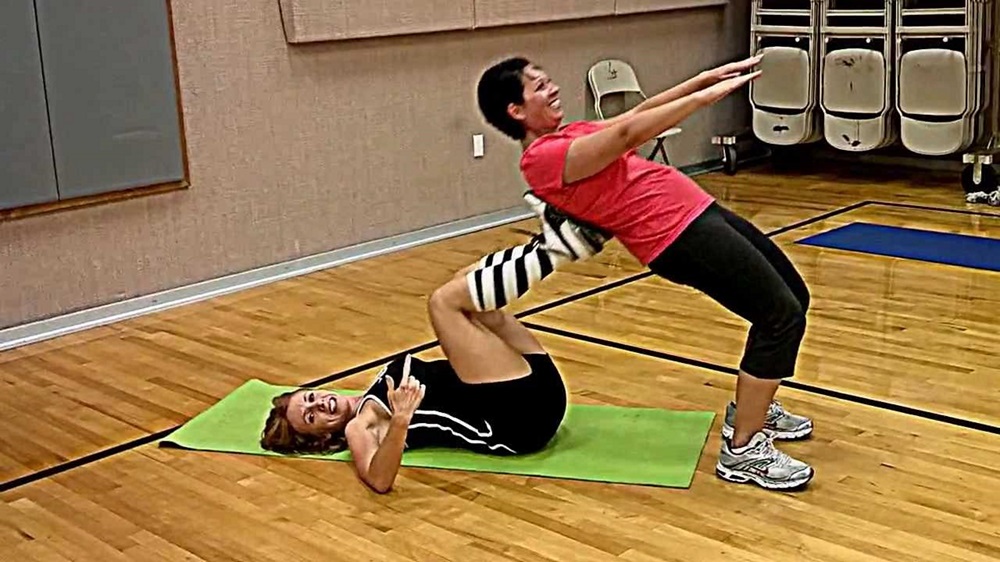
Setting a Regular Workout Schedule
- Consistency is key. Establishing a routine that both partners commit to strengthens accountability and ensures progress.
- By marking workout days on your calendar, you transform fitness into a non-negotiable part of your week, much like any important appointment.
Keeping Workouts Fresh and Engaging
- Incorporating new exercises or challenges keeps the spark alive in any fitness journey.
- Experiment with different types of workouts, from high-intensity interval training (HIIT) to yoga, to find what excites both of you.
- Introducing friendly competitions or setting shared goals can also add an element of fun and motivation.
Celebrating Milestones and Progress
- Recognizing achievements, no matter how small, is crucial.
- Celebrate the milestones in your fitness journey together. Whether it’s improving your endurance, lifting heavier weights, or simply sticking to your workout schedule, acknowledging these victories fosters a deeper connection and commitment to your shared goals.
Partner workouts are not just about physical fitness; they’re about building a partnership that thrives on support, motivation, and shared success. By setting a regular schedule, keeping workouts fresh, and celebrating progress, you lay the foundation for a sustainable and rewarding fitness journey together.
Wrapping It Up
Together, we achieve more. This simple truth underscores the power of partner workouts, where camaraderie fuels progress. Through shared challenges and triumphs, these exercises forge not just stronger bodies, but stronger bonds. From the synchronization of movements to the celebration of each milestone, the journey of fitness becomes a shared adventure, rich with mutual support and motivation. Let’s step forward, together, into a future where every workout is an opportunity to connect, grow, and thrive alongside someone who shares our goals.

